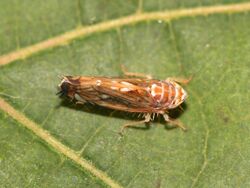Biology:Scaphoideus titanus
From HandWiki
Short description: Species of true bug
| Scaphoideus titanus | |
|---|---|

| |
| Female S. titanus on a grapevine leaf | |
| Scientific classification | |
| Domain: | Eukaryota |
| Kingdom: | Animalia |
| Phylum: | Arthropoda |
| Class: | Insecta |
| Order: | Hemiptera |
| Suborder: | Auchenorrhyncha |
| Family: | Cicadellidae |
| Genus: | Scaphoideus |
| Species: | S. titanus
|
| Binomial name | |
| Scaphoideus titanus Ball, 1932
| |
Scaphoideus titanus, the American grapevine leafhopper, is an insect of the leafhopper family (Cicadellidae) which feeds on various plants of the family Vitaceae. Native to North America, it was introduced by accident to Europe where it has become a pest by acting as a vector of the grapevine phytoplasma disease flavescence dorée.[1] Mating requires species-specific vibrational patterns that males emit to the females, which are often victim to reproductive interference, including vibrational mating disruption caused by humans for pest control purposes.[2] Nymphs do not engage in vibrational communication.[3]
References
- ↑ Papura, Daciana (2012). "Microsatellite and mitochondrial data provide evidence for a single major introduction for the Nearctic leafhopper Scaphoideus titanus in Europe". PLoS ONE 7 (5): e36882. doi:10.1371/journal.pone.0036882. PMID 22629338. Bibcode: 2012PLoSO...736882P.
- ↑ Zaffaroni-Caorsi, Valentina; Nieri, Rachele; Pugno, Nicola M.; Mazzoni, Valerio (July 2022). "Effect of vibrational mating disruption on flight activity and oviposition to control the grapevine pest, Scaphoideus titanus". Arthropod Structure & Development 69: 101173. doi:10.1016/j.asd.2022.101173. PMID 35636340. https://qmro.qmul.ac.uk/xmlui/handle/123456789/83385.
- ↑ Chuche, Julien; Thiéry, Denis; Mazzoni, Valerio (July 2011). "Do Scaphoideus titanus (Hemiptera: Cicadellidae) nymphs use vibrational communication?". Naturwissenschaften 98 (7): 639–642. doi:10.1007/s00114-011-0808-x. PMID 21656005. Bibcode: 2011NW.....98..639C.
Wikidata ☰ Q2972256 entry
 |

